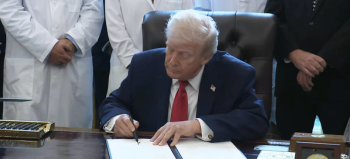
House of Representatives Approve Cannabis Banking Reform in Historic Vote
According to a press release from the National Cannabis Industry Association (NCIA), a standalone cannabis policy reform bill was brought before the House of Representatives for a vote on Wednesday, September 25, 2019 and passed with an overwhelming bipartisan majority.
According to a press release from the
“Having worked alongside Congressional leaders to resolve the cannabis industry’s banking access issues for over six years, it’s incredibly gratifying to see this strong bipartisan showing of support in today’s [yesterday’s] House vote,” said Aaron Smith, executive director of the NCIA. “We owe a great debt of gratitude to the bill sponsors, who have been working with us to move this issue forward long before anyone else thought it was worth the effort.”
H.R. 1595 was introduced in this session by Representatives Ed Perlmutter (D-CO), Denny Heck (D-WA), Steve Stivers (R-OH), and Warren Davidson (R-OH) with more than 100 other original cosponsors, eventually reaching 206 cosponsors prior Wednesday’s vote.
In light of current federal laws and financial regulations, most banks are unwilling to risk prosecution or punishment to work with state-legal cannabis businesses and often ancillary businesses that service the cannabis industry. According to the NCIA, this forces many cannabis businesses to operate almost entirely in cash, creating public safety issues for everyone involved, from businesses and their employees to tax collectors and regulators. In addition, these policies hinder the efforts of regulators and law enforcement to effectively monitor the legal cannabis market. Financial services institutions are also unable to provide loans to people in the cannabis industry, which disproportionately impacts small businesses and marginalized communities with less access to personal wealth or investment capital.
According to the
“Now, it’s time for the Senate to take swift action to approve the SAFE Banking Act so that this commonsense legislation can make its way to the President’s desk,” said Smith. “This bipartisan legislation is vital to protecting public safety, fostering transparency, and leveling the playing field for small businesses in the growing number of states with successful cannabis programs.”
NCIA plans to host a press conference with lawmakers and allied organizations to discuss the vote on Thursday, September 26 at 2:30 p.m. ET at the House Triangle, just outside Washington, D.C. The press conference will reportedly include the following people:
- Rep. Ed Perlmutter (D-CO)
- Rep. Denny Heck (D-WA)
- Rep. Steve Stivers (R-OH)
- Rep. Earl Blumenauer (D-OR)
- Aaron Smith, National Cannabis Industry Association
- Rob Nichols, American Bankers Association
- Jim Nussle, Credit Union National Association
- Steve Hawkins, Marijuana Policy Project
- Brandon Banks, Minority Cannabis Business Association
- Saphira Galoob, National Cannabis Roundtable
- Justin Strekal, National Organization for the Reform of Marijuana Laws
- Becky Dansky, Safe and Responsible Banking Alliance
References:
Newsletter
Unlock the latest breakthroughs in cannabis science—subscribe now to get expert insights, research, and industry updates delivered to your inbox.




